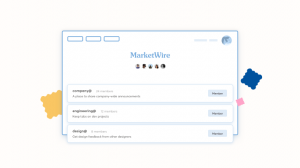Hardly anybody is one individual person anymore. In the old days of the internet, people joked that its anonymity meant you could meet anyone online, even a dog. As social media became central to everyday life in the 2010s, people started complaining (or crowing) about leading a strange double life—their ordinary existence, and a polished, highly shareable lie manufactured for online adoration. Now that the strangeness has worn off and cultivating multiple appealing personas is mainstream, the effort involved in maintaining the multifaceted social media self is intentionally invisible. Many people seem to live quadruple lives and not think anything of it.
Country singer Dolly Parton sees right through you. On January 21, Parton—who is an internet savvy queen at 74—posted four images of herself on Instagram, each labeled with the name of a different social media platform. LinkedIn Dolly is all buttoned up with a frilly scarf around her neck. Facebook Dolly is laid back and approachable in a Christmas sweater. Instagram Dolly is a #throwbackthursday: a black-and-white shot of a young Parton posing with a guitar in front of a “distressed” wooden door. And Tinder Dolly? She’s a Playboy bunny. Parton captioned the image “Get you a woman who can do it all 😉” and, almost instantly, had a viral meme on her hands.
The post has close to 800,000 likes and dozens of imitators, many of them celebrities. Participants include actresses like Jennifer Garner, Kerry Washington, and Kristin Chenoweth, and comedians like Ellen DeGeneres and Conan O’Brien. (The latter using their “Tinder” images more as punchlines than thirst traps.) Internet celebrities like Doug the Pug (and many, many other pets) got in on the game. A gentle mockery of the original format has already begun. Terry Crews’ entry is four near-identical photos of him shirtless and sweaty. We now know what a candle brand thinks its Tinder profile picture should be. (Hint: It involves spilled wax.)
If you spell the themes out, they’re pretty obvious: LinkedIn images are formal and conservative, Facebook’s are family-friendly, Instagram’s are glamorous, and Tinder’s are sexy. Duh. You knew this. But memes that are obvious and dull don’t go viral—memes that are obvious and insightful do.
The comfortable truth in Parton’s meme is that people like self-deprecation. Celebrities lining up to showcase examples of their own artifice is very #relatable of them. For everyone else, it’s a way to poke fun at their obviously manufactured selves, and at the society-wide impulse to spin your image to meet not just one ideal, but four (at least). Everyone’s a literal poser; Parton’s meme just puts that effort out in the open.
What’s more interesting is the other thing the meme exposes: Social media platforms have developed their own visual styles that are so distinct and familiar users are now completely fluent in them. Even when moving between Facebook and Instagram, which are really the same company, users make an automatic visual code switch. Posting a LinkedIn image when starting a Tinder profile is about as bizarre as speaking German upon landing in Beijing. It just isn’t done, in part because most people won’t know how to respond. They won’t be able to see what you’re trying to say.
More Great WIRED Stories
- He wanted a unicorn. He got … a sustainable business
- Hollywood bets on a future of quick clips and tiny screens
- Dirty money and bad science at MIT’s Media Lab
- Cats are making Australia’s bushfire tragedy even worse
- Public blast or private chat? Social media maps a middle way
- 👁 The secret history of facial recognition. Plus, the latest news on AI
- 💻 Upgrade your work game with our Gear team’s favorite laptops, keyboards, typing alternatives, and noise-canceling headphones



